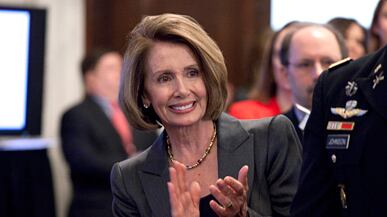The Tea Party helped elect the largest freshman class in six decades on the strength of their commitment to come to Washington and cut the deficit. When 54 House Republicans voted no on the latest stopgap budget measure to fund the government for three weeks, most people assumed these were the crusading freshmen determined to fulfill their promise to the voters. But they are wrong: only 20 of the 54 who voted no are part of the 87-member-strong class of 2010; the rest are more veteran members.

“I watched the debate very carefully,” Nancy Pelosi told a small group of reporters Wednesday afternoon. “New members are interested in cuts; more senior members are interested in riders, the policy stuff,” an observation that she shared with her successor, John Boehner. “He didn’t comment on it,” she says. These “riders” would defund National Public Radio, Planned Parenthood, and the new health-care law. Pelosi’s point is not about their differing ideology but the mathematics of reaching the 218 votes Boehner needs in the House.
Without the support of 85 Democrats, the temporary budget bill would have failed. Pelosi has watched the debate on riders in Congress for years, and when it comes to abortion rights, she recognized what she called “regulars on the subject,” and they were senior members. The new members do seem genuinely focused on budget-cutting and more willing to set aside other issues. “There has to be a place to come down to a number, and Democrats can be helpful,” she says.
“I’m a vote counter,” Pelosi says. As speaker, she never lost a vote and never depended on Republican votes; she didn’t have to, with the large majority the Democrats enjoyed. Boehner too has a large majority, but the divisions within his ranks are complicating his path to 218. “He knows we have offered him a hand of friendship,” Pelosi says. “I’m not sure whether he sees this hand of friendship as a plus or minus.” Calling herself “the eternal optimist,” the California Democrat says that, upon reflection, “there’s only one question at the end of the day: do you understand how serious it is to shut down the government?”
Pelosi has lost none of her zest for the fight now that she is in the minority. Her lemon-yellow office walls are bare, as though she doesn’t intend to stay for long before reclaiming power. “In some ways, it may be easier to win 25 seats than to hold 63 seats,” she says. Her quarters were formerly occupied by the legendary Tip O’Neill when he was speaker, “so coming back here is no pain in terms of the accoutrements of power,” she says, adding with a wry laugh: “We just don’t have the power.”
“He knows we have offered him a hand of friendship,” Pelosi says. “I’m not sure whether he sees this hand of friendship as a plus or minus.”
She warms to a question about the first anniversary of the passage of health-care reform—March 23 in the Senate; March 30 in the House—going on at length about the positive aspects of the bill that people have begun to see, and recounting an emotional press conference with sufferers of diabetes, a preexisting condition that will no longer make people uninsurable. As the anniversary approaches, Pelosi is taking some victory laps, but the poll numbers point to a steep climb for what Democrats once thought would be hailed as a major victory. Republican pollster Neil Newhouse says people’s current attitudes are “mixed leaning negative,” with more people wanting to repeal the health-care law than keep it in place. “They overreacted by trying to tackle health care before they had their arms around the economy, and they never sold the thing,” says Newhouse. “And most people thought they would be hurt by it.” Repeal won’t happen, but Republicans will try to get around the law every way they can, he says.
Beyond tapping into anxiety about mounting government spending, Republicans won their majority by attacking Democrats for failing to focus on job creation. Now Democrats are pointing out that 11 weeks into the new GOP-led House, there haven’t been any Republican jobs proposals. “Good luck with that,” says Newhouse. “There’s a reason we haven’t been successful. Nobody’s got an easy answer to getting unemployment down.”
It’s easy to lob criticism at the party in power, and now it’s Pelosi’s turn to ask where the jobs are. But if her math is right, and Boehner needs a deal, he may find Pelosi a more accommodating negotiator than some of his own members.
Correction: The date of Senate passage was initially misstated.
Eleanor Clift is a contributing editor for Newsweek.






